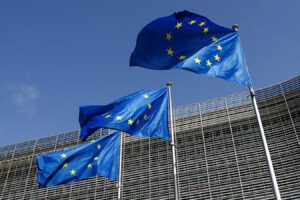By Justine Irish D. Tabile, Reporter
THE European Union (EU) is expected to look into the opening up of government procurement and full market access to public utilities in negotiating the EU-Philippine free trade agreement (FTA), a business council official said.
Chris Humphrey, executive director of the EU-ASEAN Business Council (EU-ABC), told BusinessWorld that nevertheless, he does not expect “too many big hurdles” in negotiating for the FTA.
“We’re not seeing too many big hurdles till we get this deal over (although) the EU will look for some opening up on things like government procurement and making sure that there is full market access in certain areas like public utilities,” Mr. Humphrey said.
“But the Philippines has shown a willingness to move on these. So I’m not expecting a great deal of problems,” he added.
Philipp Dupuis, EU Delegation to the Philippines Minister Counsellor and Head of the Economic and Trade Section, said that government procurement is the EU’s standard approach to negotiations.
“In every negotiation, we cover government procurement. So it’s not anything we would do specifically with the Philippines; we have it everywhere,” Mr. Dupuis said in a chance interview.
“Because there’s still restrictions for foreigners in the Philippines. (So) in principle, yes, this is something we will address. It’s a matter of negotiation in the end, but it’s something we will put on the table, yes,” he added.
However, Mr. Humphrey said that these are not of concern within the EU community and added that the resumption of the negotiations points to an extremely high chance of being able to conclude a deal to each side’s satisfaction.
“That automatically means a big alignment with the ambition for the scope of the FTA. I think the key difference here is that Europe, when it does FTAs, includes a number of non-core trade elements,” he said.
”Unlike some other countries, which find them a bit harder to swallow in an FTA agreement, the Philippines has made it very clear that we can move on these issues and we can work with Europe on these issues,” he added.
Because of the high level of alignment, Mr. Humphrey said that there is confidence that the deal can be done fairly quickly.
“And I suspect that the negotiators on both sides are telling each other to get this deal done before the end of President Ferdinand R. Marcos, Jr.’s term in office,” he said.
“So we’re probably looking at a three-year horizon to get this deal done. And that, in FTA negotiation terms, is actually very quick,” he added.
Regarding a timeline for the negotiations, Mr. Dupuis said: “This is something that is impossible to answer; to be honest, you never know. It’s a negotiation, so it will take time,” he said.
“It’s important to note that from the EU side, we always want to have a negotiation as quickly as possible, but never at the expense of the quality of the work,” he added.
He added that the EU has been able to negotiate some FTAs in two years, while other FTAs took over five years to be concluded.
Meanwhile, Mr. Humphrey said that the EU-ABC will be bringing a business delegation to the Philippines next month aimed at letting European businesses get a better understanding of the policy direction in the Philippines.
The delegation will be 50-strong, including representatives from industries like information and communications technology, health, transportation, financial services, agriculture and food, and fast-moving consumer goods.
